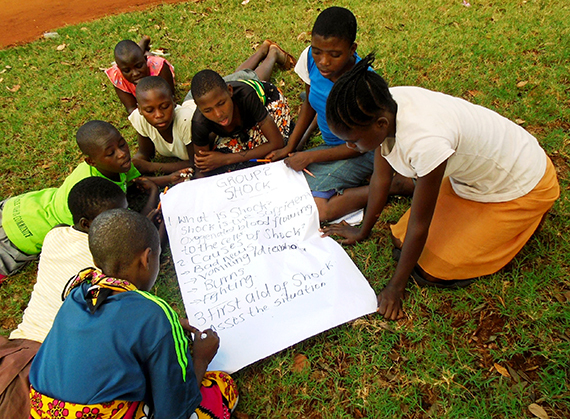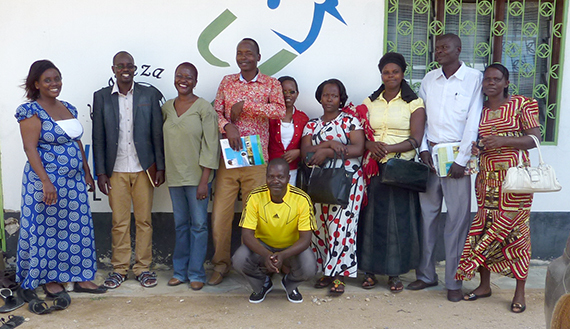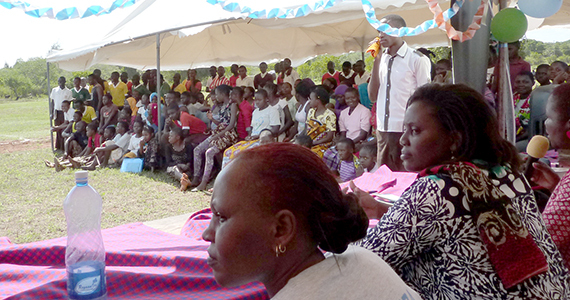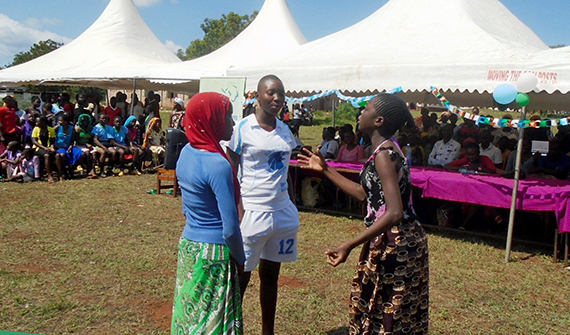I hope you'll dive into this article by Kelsi Hines and Kevalin Aulandez and the work of Organic Health Response described therein. As the father of a young daughter, I find it unimaginable to consider a reality in which she would feel forced to exchange sex for food. As gut-wrenching as that scenario is, the clever responses to change that paradigm on a remote island in Lake Victoria are somehow as inspiring...
Imagine you are an adolescent girl in rural Kenya. Like generations of girls before you, your path, opportunities, and odds in life are largely set at birth. Unlike your male peers of the same age, you are 2.9% more likely to contract HIV between the ages of 15-24. As you grow up you are forced to gamble with these odds in order to fulfill your responsibilities. You are a crucial building block of your family, of your community, and of the future generation of your children. You may need to choose between care-taking for your family and getting an education. You may feel the need to put your health at risk to find food for the table. Planning for the future takes a backseat as you juggle urgent daily decisions that impact your health.
Organic Health Response, a community-based health organization, works to strengthen the capacity and confidence of residents of Mfangano Island, Kenya to protect their health, culture, and unique island ecosystem. Located in the heart of Lake Victoria, roughly 30% of this remote island's population is HIV positive. The young women and adolescent girls of Mfangano carry, like their global sisters, a disproportionately large burden of HIV/AIDS infection. In a culture where women hold sole responsibility for feeding their families and caring for those ill due to HIV/AIDS, young girls often have no choice but to engage in sexual relationships with local or traveling fishermen in order to procure fish for their families to eat. Living 10 miles off the shores of Kenya's mainland, the young women of Mfangano Island lack access to comprehensive sex education and quality reproductive health services. Transgenerational relationships, gender-based violence, and systemic gender inequality are additional factors that contribute to making Mfangano's young women particularly vulnerable to contracting HIV.
As we at Organic Health Response began to design a reproductive health education program to address these issues facing adolescent girls in our community, we took the opportunity to visit a fellow Segal Family Foundation partner, Moving the Goalposts Kilifi (MTG), to learn about their unique model to empowering girls in coastal Kenya. During our visit, we learned an important lesson: to empower our girls we must start with our elders. Moving the Goalposts Kilifi uses football as an entry point to tackle issues such as a girl's vulnerability to HIV/AIDS, low retention rates in school of female students, and early and unwanted pregnancies. Through bi-annual football camps girls develop essential leadership skills and participate in peer-led education on sexual and reproductive health, economic empowerment, and career guidance.
We saw the impact on the girls we met during our visit to MTG. MTG's biggest barrier to successful programming, however, is that girls are often denied permission by their parents to attend football camps focused on reproductive health and sex education. For Moving the Goalposts Kilifi, this is why parental education is a crucial strategy in their organization, one without which they would not be able to meet their programming goals. "Tumanyane," a Giriama word for "let's know each other" is a community and parental forum organized by MTG that is used to increase parental and community support for girl's empowerment. With understanding and support from their parents and elders, adolescent girls are able to make choices that support their own health and livelihood. As the old African proverb goes, "If you educate a boy, you educate an individual. If you educate a girl, you educate a community."
As for Mfangano Island, Organic Health Response is eager to apply the lessons we learned from MTG and engage our elders to invest in the future of our young women. We look forward to using our community radio station, Ekialo Kiona Youth Radio, to engage with, and host, call-in shows on the importance of reproductive health and women's empowerment. By empowering elders with the knowledge they need to promote the advancement of their young women, Organic Health Response is working to change the current narrative on Mfangano Island. When young women are given the knowledge they need to protect themselves, and families and communities support them in making healthy reproductive decisions, they are empowered to make sexual choices that allow themselves, their families and their communities to thrive.
Sources
National Aids Control Council. Kenya AIDS response progress report 2014: progress towards zero. http://www.unaids.org/sites/default/files/country/documents/KEN_narrative_report_2014.pdf. Published March, 2014. Accessed July 12, 2016.
UNAIDS and the African Union. Empower young women and adolescent girls: fast-tracking the end of the AIDS epidemic in Africa. http://www.unaids.org/sites/default/files/media_asset/JC2746_en.pdf. Published 2015. Accessed July 12, 2016.
Nagata JM, Fiorella KJ, Salmen CR, et al. Around the table: food insecurity, socioeconomic status, and instrumental social support among women living in rural Kenyan island community. Ecology of Food and Nutrition. 2015; 00:1-12. DOI: 10.1080/03670244.2014.995790. Accessed July 12, 2016
Fiorella KJ, Camlin CS, Salmen CR, et al. Transactional fish-for-sex relationships amid declining fish access in Kenya. World Development. 2015; 74: 323-332. http://dx.doi.org/10.1016/j.worlddev.2015.05.015. Accessed July 12, 2016.
Bellan SE, Fiorella KJ, Melesse DY, Getz WM, Williams BG, Dushoff J. Extra-couple HIV transmission in sub-Saharan Africa: a mathematical modelling study of survey data. http://dx.doi.org/10.1016/S0140-6736(12)61960-6. Published February 5, 2013. Accessed July 18, 2016.




